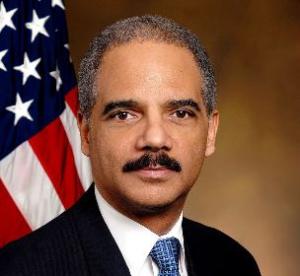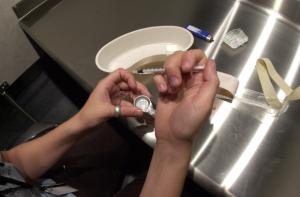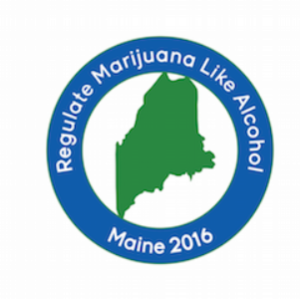In a culmination of trial programs and research, and in a reversal of policies of the former Harper Administration, Health Canada has cleared the way for prescription heroin for tough cases.
More than 17,000 federal drug war prisoners have clemency applications pending under a Justice Department program, but with Obama's term coming to an end, the clock is ticking.
Marijuana activists are set to protest pot prohibition at the White House Friday. They want Obama to deschedule it, but that's just for starters.
The move is intended to ease access to medical marijuana for veterans suffering from PTSD, serious injuries, and other debilitating conditions.
In Oklahoma and Ohio, medical marijuana half-measures are being challenged by initiative campaigns, Oakland tries to create some racial equity in the industry, Maryland medical marijuana hits another delay, and more.
A sticky-fingered Wisconsin cop gets nailed, a truth-challenged Washington state cop gets canned, and more.
Congress acts on opioid and drug trafficking bills, million want to grow pot if it's legal, a CBD cannabis oil bill moves in Louisiana, a medical marijuana bill is killed in Missouri, and more.
A new Maine poll has majority support for legalization, Indonesia is about to execute more drug war prisoners, and more.
A Tax Foundation study finds that legal pot could generate $28 billion a year in tax revenues, CBD cannabis oil isn't enough for Oklahoma medical marijuana activists, Canada will allow prescription heroin, and more.
Another New England legislature fails to act on pot legalization, Maryland's long-awaited medical marijuana program is again delayed, Wisconsin's GOP attorney general wants all employers to drug test their workers, and more.
Organized opposition is trying to emerge in California, legalization in Oregon is creating jobs and payrolls, Oakland attempts to redress racial imbalance in the legal marijuana business but catches some flak, and more.
Marijuana activists prepare to march on the White House, Congress moves on medical marijuana for veterans, Bernie Sanders endorses California's AUMA legalization initiative, and more.
This article was produced in collaboration with AlterNet and first appeared here.
Health Canada announced Friday that it is proposing new regulations to allow access to prescription heroin under its Special Access Program (SAP). That program allows for emergency access to drugs for serious or life-threatening conditions when conventional treatments have failed or are unsuitable.

Health Canada clears the way for prescription heroin. (Wikmedia/Creative Commons)
"A significant body of scientific evidence supports the medical use of diacetylmorphine, also known as pharmaceutical-grade heroin, for the treatment of chronic, relapsing
opioid dependence. Diacetylmorphine is permitted in a number of other jurisdictions, such as Germany, the Netherlands, Denmark, and Switzerland, to support a small percentage of patients who have not responded to other treatment options, such as methadone and
buprenorphine," the statement said.
The move is yet another reversal of hardline Conservative drug policies by the Liberal government headed by Prime Minister Justin Trudeau, which was elected last fall. The Trudeau government has pivoted sharply away from Conservative positions in favor of mandatory minimum drug sentences and against marijuana legalization, and now is moving to undo Conservative efforts to block the limited use of prescription heroin.
Canadian scientists had laid the groundwork for prescription with the North American Opiate Medication Initiative (NAOMI), which first tested "heroin-assisted maintenance" in Vancouver a dozen years ago, and which was followed by the Study to Assess Long-Term Opioid Maintenance Effectiveness (SALOME) between 2005 and 2008. SALOME examined whether giving hard-core heroin users heroin was more effective than giving them methadone.
SALOME showed that the users in the study were more likely to stay in treatment, reduce other illegal drug use, engage in fewer other illegal activities and have better physical and mental health outcomes if given heroin than if given methadone. But when that study ended in 2008, researchers were faced with the ethical dilemma of cutting off the patients whose lives were being improved by prescription heroin.
The doctors began applying for, and receiving, permission under the Special Access Program, and Health Canada approved those applications in 2013. But that infuriated the Conservatives, and then-Health Minister Rona Ambrose introduced new regulations to bar doctors from prescribing "dangerous drugs" such as heroin, cocaine, and LSD.
Former SALOME participants launched a constitutional challenge to the ban and in 2014 won a temporary injunction giving them the right to continue to receive prescription heroin while the case was being decided. Now, with Health Canada's move, the federal government will no longer attempt to block prescription heroin.
That was good news for the Pivot Legal Society, which argued the case for continuing the prescriptions, and for Providence Health Care, in whose Crosstown Clinic in Vancouver's Downtown Lower East Side the heroin was administered.
"Allowing access to diacetylmorphine, or medical heroin, to patients who need it, ensures that life-saving treatments get delivered to vulnerable people suffering from chronic opioid use," the two groups said in a joint statement.
Canada is leading the way on cutting edge responses to heroin addiction in North America. In addition to the groundbreaking NAOMI and SALOME studies, which cannot be replicated in the US under current law and regulations, Canada has also had safe injection sites operating in Vancouver for more than a decade. We still don't have any of those in the US.
back to top
This article was produced in collaboration with AlterNet and first appeared here.
With the sentence commutations announced last week, President Barack Obama has now cut more than 300 harsh drug war prison sentences, more than the previous six presidents combined. Thousands more could be eligible for commutations, but bureaucratic obstacles inside the Justice Department mean the clock could run out before Obama gets a chance to free them.

Thousands could go free with sentence cuts this year -- if bottlenecks are fixed. (nacdp.org)
As part of the Obama administration's emphasis on criminal justice reform and reducing the federal prison population, then Attorney General Eric Holder and Deputy Assistant Attorney General James Cole called on nonviolent federal drug war prisoners to
seek clemency in April 2014.
"In 2010, President Obama signed the Fair Sentencing Act, reducing unfair disparities in sentences imposed on people for offenses involving different forms of cocaine, but there are still too many people in federal prison who were sentenced under the old regime -- and who, as a result, will have to spend far more time in prison than they would if sentenced today for exactly the same crime," said Holder at the time. "This is simply not right."
Holder noted that Obama had granted commutation to eight people serving time for crack offenses the previous December.
"The White House has indicated it wants to consider additional clemency applications, to restore a degree of justice, fairness, and proportionality for deserving individuals who do not pose a threat to public safety. The Justice Department is committed to recommending as many qualified applicants as possible for reduced sentences," Holder said.

The mass clemency program is one of Eric Holder's sentencing reform legacies. (justice.gov)
Under Holder's criteria for clemency, low-level drug offenders who had served at least 10 years, had good conduct in prison, had no significant criminal history or connection to gangs, cartels, or organized crime, and who would probably receive a "substantially lower sentence" if convicted of the same offense today would be eligible for sentence cuts.
Of roughly 100,000 federal drug prisoners -- nearly half the entire federal prison population -- more than 36,000 applied for clemency. Many of them did not meet the criteria, but the Justice Department has reviewed nearly 9,500 that did. Of those, only the 306 have actually been granted clemency; applications are still pending for 9,115 more. (An additional 8,000 pending applications are being handled by a consortium of private attorneys, the Clemency Project.)
Many of those might not make it to Obama's desk before the clock runs out on his term because the Justice Department has stumbled in administering the program. Thousands of prisoners doing harsh drug war sentences could lose their chance for early freedom because Justice didn't get around to hiring enough people to handle the flood of applications it generated.
The situation so infuriated Office of Pardons attorney Deborah Leff, who was hired to oversee the project, that she quit earlier this year. Her resignation letter to Deputy Attorney General Sally Yates made it clear why.
Despite her "intense efforts" to do her job, Justice had "not fulfilled its commitment to provide the resources necessary ffor my office to make timely and thoughtful recommendations on clemency to the president," she wrote. "The position in which my office has been placed, asking us to address the petitions of nearly 10,000 individuals with so few attorneys and support staff, means that the requests of thousands of petitioners seeking justice will lie unheard."
It wasn't just that Justice wasn't adequately staffing the pardons office -- it had a total of 10 staff attorneys -- but Yates was overturning the pardon attorneys' recommendations and blocking the office's traditional access to the White House, Leff complained.
"I have been deeply troubled by the decision to deny the Pardon Attorney all access to the Office of the White House Counsel, even to share the reasons for our determinations in the increasing number of cases where you have reversed our recommendations," Leff wrote in her resignation letter to Yates.

US Pardon Attorney Deborah Leff resigned in frustration.
"It is essential that this groundbreaking effort move ahead expeditiously and expand," she wrote, implying that the Justice Department process was stalling justice.
The staffing problems had been apparent early on, which is why the Department turned to the Clemency Project to help out last year. But that effort, which involved some 4,000 attorneys from 30 law schools, 70 large law firms, and more than 500 small firms and solo practitioners doing pro bono work, has also been slow to get rolling.
Now, with the days slipping away and freedom for thousands in the balance, both the Justice Department and the Clemency Project are feeling the heat. White House Counsel Neil Eggleston told the Washington Post last week that many more petitions will be granted in Obama's final months and that the Justice Department has doubled the number of lawyers at the pardon office. And administration officials said that President Obama wants to see more petitions on his desk.
"The President is deeply committed to the clemency initiative. That is evident not only by the historic number of commutations he's granted to date, but by his wholesale approach to revamping the way the government approaches commutations," White House spokeswoman Brandi Hoffine said in a statement.
The Justice Department said it was working hard, too.
"The Justice Department has dedicated the maximum amount of resources allowed by Congress to the Office of the Pardon Attorney, and we have requested additional funds from Congress for each year the initiative has been in place," spokeswoman Emily Pierce said in a statement.
But it may be too little, too late for the thousands of men and women behind bars who could see freedom being waved in front of them only to vanish when the clock runs out, if things don't change quickly.
back to top
This article was produced in collaboration with AlterNet and first appeared here.
A demonstration headed by the DC Cannabis Campaign and Weed for Warriors is set for the White House Friday after the Obama administration failed to respond to the groups' requests for "higher level consultations" following an initial meeting with White House staffers last month.
Headed by longtime DC political gadfly Adam Eidinger, the DC Cannabis Campaign is the group behind the District's successful 2014 marijuana legalization initiative. The campaign's White House demonstration last month led to that initial meeting and to the campaign's call for further meetings.
Weed for Warriors is a group dedicated to working with the Veterans Administration to ensure that vets "have the freedom to use medical marijuana as a recognized medical alternative to harmful psychiatric drugs."
Organizers are saying the event won't be a smoke-in, but it will come close. "This will be an unpermitted event with mass cannabis consumption and escalated civil disobedience," demonstration promotional materials say.
"Support veterans risking arrest!" the groups say. "They will lead a mass die-in calling for an end to the war on drugs."
The groups are calling on the Obama administration to deschedule -- not reschedule -- marijuana before the president leaves office in January. But they are also clear that the ultimate goal is ending prohibition.
"You should understand our protests are not just for medical research into cannabis, but ending cannabis prohibition once and for all," the DC Cannabis Campaign said in its letter to the White House earlier this month. "You have the opportunity to heal the national wound of unjust cannabis policies that have always targeted minorities, hurt patients and corrupted policing in America for nearly 80 years."
The date, May 20, is no accident. It's the birthday of arch-prohibitionist Harry J. Anslinger, who, as head of the Federal Bureau of Narcotics for decades in the mid-20th Century, was a founding father of the modern war on drugs. The protestors note that Anslinger built support for pot prohibition by resorting to racist and xenophobic justifications, as Anslinger's own words make clear:
"There are 100,000 total marijuana smokers in the US, and most are Negroes, Hispanics, Filipinos, and entertainers. Their Satanic music, jazz, and swing, result from marijuana use. This marijuana causes white women to seek sexual relations with Negroes, entertainers, and any others."
"… the primary reason to outlaw marijuana is its effect on the degenerate races."
"Marijuana is an addictive drug which produces in its users insanity, criminality, and death."
"Reefer makes darkies think they're as good as white men."
"Marijuana leads to pacifism and communist brainwashing."
"You smoke a joint and you�re likely to kill your brother."
"Marijuana is the most violence-causing drug in the history of mankind."
The bigotry and racism behind Anslinger's attack on marijuana have remained embedded in prohibition, with black people being arrested at a rate nearly four times that of whites. And five million people have been arrested on marijuana charges since President Obama has been in office -- nearly 90% of them for simple possession.
"Given the compelling and staggering facts as to why these failed cannabis policies harm Americans, we are sure you can understand why we cannot tolerate your inaction on these important issues any longer," the groups said in their letter to the White House. "We simply cannot stand on the sidelines and watch while everyday more Americans are harmed by what is clearly racist and unconstitutional failed drug policies. This is why we are requesting a formal response regarding the above from your administration before May 20th."
That formal response didn't happen, so Friday's demonstration at the White House is happening.
back to top
This article was produced in collaboration with AlterNet and first appeared here.
The House and Senate on Thursday approved amendments to the Military Construction and Veterans Affairs appropriations bill that should ease access to medical marijuana for veterans suffering from Post-Traumatic Stress Disorder (PTSD), serious wounds, and other debilitating conditions.
Sponsored in the House by Earl Blumenauer (D-OR) and Joe Heck (R-NV), and in the Senate by Steve Daines (R-MT) and Jeff Merkley (D-OR), the measure would bar the spending of federal funds to enforce a Veterans Health Administration policy that prohibits VA physicians from recommending medical marijuana, even in states where it is legal. Once the measure becomes law, VA docs would no longer face penalties for discussing medical marijuana with patients or for providing recommendations for patients to participate in state-legal medical marijuana programs.The House and Senate versions of the appropriations bill have to be reconciled by a conference committee and passed again by both chambers. The medical marijuana amendments passed 233-189 in the House and 89-8 in the Senate.
With the ban in place, even in states with medical marijuana laws, veterans must go outside the VA system to get a recommendation or even discuss medical marijuana with their doctors. That VA policy actually expired at the beginning of this year, but would remain in force without congressional action. And Congress has acted.
"Today is a monumental day for us vets," said TJ Thompson, a disabled U.S. Navy Veteran who lives in Virginia. "Congress has recognized our right to heal, allowing us access to medical cannabis within the VA.
Marijuana policy reformers, who have long fought to remove obstacles to veterans' use of medical marijuana, were pleased, too.
"Prohibiting VA doctors from recommending medical marijuana does nothing to help our veterans," said Robert Capecchi, director of federal policies for the Marijuana Policy Project. "Current VA policy is preventing physicians from thoroughly monitoring patients' medication decisions and engaging in frank conversations about available treatment options. It dramatically undermines the doctor-patient relationship."
"It's looking like this could finally be the year the federal government stops making veterans jump through costly, time-consuming hoops just to get legal access to medical marijuana," said Tom Angell, head of Marijuana Majority. "Cannabis has shown great promise in helping veterans deal with PTSD and treat chronic pain, and it's an increasingly attractive alternative to opioids. There's absolutely no reason the VA should be preventing its doctors from helping veterans who served our country find relief with medical marijuana."
"We are delighted to lift this outdated, discriminatory policy, which has negatively impacted the lives of so many veterans." said Michael Collins, deputy director for the Drug Policy Alliance's Office of National Affairs. "We need all options on the table to treat veterans, and finally Congress has seen sense and will allow veterans to be on an equal footing to other residents of medical marijuana states."
After today's votes, the two chambers will take up reconciling and differences between the two versions of the appropriations bills before sending them to the president.
back to top
In Oklahoma and Ohio, medical marijuana half-measures are being challenged by initiative campaigns, Oakland tries to create some racial equity in the industry, Maryland medical marijuana hits another delay, and more.
CaliforniaOn Tuesday, Oakland passed an ordinance designed to encourage minority participation in the industry. The city council unanimously approved a medical marijuana ordinance with an "equity program" that would reserve half of the city's new cannabis permits for people who live in a designated high-crime police beat in East Oakland or were imprisoned for marijuana-related crimes in Oakland in the past 10 years. But the plan is coming under fire from industry leaders who say it may actually be counterproductive to encouraging minority participation and could undercut a pot economy expected to boom if and when the state legalizes marijuana.
Louisiana
Last Wednesday, the House passed a CBD cannabis oil expansion bill. The House approved Senate Bill 271, but because it amended it, the bill must now go back to the Senate for a final vote. Last year, legislators legalized CBD cannabis oil, but only for a handful of conditions. This bill expands those conditions to include seizure disorders. No one can currently use CBD cannabis oils because the legislature is still figuring out how to regulate them.
Maryland
On Tuesday, the Medical Cannabis Commission announced continuing delays in implementing the program. The state approved commission, which was created in April 2014 and is charged with establishing the state's medical marijuana program, says patients probably won't have access to medical marijuana until the late summer of 2017.
Missouri
Last Wednesday, the House rejected a medical marijuana bill. The House killed the bill on a 71-85 vote. That leaves an open path for a medical marijuana initiative whose supporters have handed in signatures and are awaiting confirmation that the initiative has qualified for the November ballot.
Montana
Last Thursday, medical marijuana supporters appealed to the US Supreme Court. The Montana Cannabis Industry Association filed a petition with the US Supreme Court seeking to reverse a state Supreme Court decision that guts the state's once-thriving medical marijuana industry. Petitioners argue that the state Supreme Court mistakenly held that marijuana is universally illegal under federal law and point to the Obama administration's decisions to allow states to implement their own marijuana laws.
Oklahoma
Last Friday, the governor signed a CBD cannabis bill into law. Gov. Mary Fallin (R) has signed into law a CBD cannabis oil expansion bill. Last year, the state approved the use of the oil, but only for people under 18. This bill removes that age restriction.
Last Saturday, medical marijuana advocates began an initiative signature gathering drive. CBD cannabis oil isn't enough for Oklahomans for Health, which began gathering signatures over the weekend for a full-blown medical marijuana initiative. The group has 90 days to gather 66,000 valid voter signatures to get the measure on the November ballot.
Ohio
Last Wednesday, a new poll had overwhelming support for medical marijuana. A new Quinnipiac University poll has support for medical marijuana at very high 90%. The poll comes as a restrictive medical marijuana bill is working its way through the legislature and as a medical marijuana initiative is in the signature-gathering phase. The poll also asked about support for legalization, which came in at 52%.
[For extensive information about the medical marijuana debate, presented in a neutral format, visit MedicalMarijuana.ProCon.org.]
back to top
A sticky-fingered Wisconsin cop gets nailed, a truth-challenged Washington state cop gets canned, and more. Let's get to it:
In Vancouver, Washington,
a Vancouver police officer was fired last week for lying about an affair he carried on with a woman and for smoking and distributing marijuana. Leonard Gabriel, a 12-year veteran, lied when confronted about the affair, violating departmental policy, smoked cannabis oil, and provided marijuana to at least three people. While pot is legal in Washington state, it remains illegal under federal law. Vancouver police are required to obey all state and federal laws.
In Madison, Wisconsin, a former Madison police officer pleaded guilty Monday to stealing nearly $4,000 in what he thought was a drug bust, but was in reality a sting. Andrew Pullman, 31, went down after authorities got a tip that he might be planning a robbery. An undercover agent posing as an informant then told Pullman she was mad at her boyfriend dealing drugs and there might be money and cocaine in the car. Pullman went for the bait, stole the money, and was arrested. He's looking at up to 10 years in prison when sentenced in August.
In New London, Connecticut, a former Ansonia police officer was sentenced last Wednesday to probation for stealing drugs from the evidence room. Matt Macero, a 15-year veteran, admitted to stealing an Oxycontin pill from the department in one incident and to falsely telling his superiors he had been exposed to cocaine during an investigation and as a result he would test positive. He copped to one count of fourth degree larceny, one count of making a false statement to police, and one count of falsely reporting an incident.
back to top
Congress acts on opioid and drug trafficking bills, million want to grow pot if it's legal, a CBD cannabis oil bill moves in Louisiana, a medical marijuana bill is killed in Missouri, and more.

Safe injection sites are coming to Ireland. (vch.ca)
Millions of Americans Would Grow Pot at Home If It Were Legal, Survey Finds. A new Harris Poll conducted for Green State Gardener has found that a whopping 44.5 million adult Americans would grow their own at home if it were legal. That's 18% of all adults, up from 10% only last year. "A year or two of research doesn't establish a trend yet, but the jump in these numbers is pretty significant," said industry analyst Bruce Butterfield. "The largest number of adults most likely to grow marijuana themselves is 18 to 34 year olds, followed by baby boomers aged 55-plus." The poll also found that 59% said marijuana should be legal, in line with other recent polls showing consistent, if narrow, majorities for legalization.
Medical Marijuana
Louisiana Houses Passes CBD Cannabis Oil Expansion Bill. The House approved Senate Bill 271 Wednesday, but because it amended it, the bill must now go back to the Senate for a final vote. Last year, legislators legalized CBD cannabis oil, but only for a handful of conditions. This bill expands those conditions to include seizure disorders. No one can currently use CBD cannabis oils because the legislature is still figuring out how to regulate them.
Missouri House Rejects Medical Marijuana Bill. The House Wednesday killed the bill on a 71-85 vote. That leaves an open path for a medical marijuana initiative whose supporters have handed in signatures and are awaiting confirmation that the initiative has qualified for the November ballot.
Ohio Poll Has Overwhelming Support for Medical Marijuana. A new Quinnipiac University poll has support for medical marijuana at very high 90%. The poll comes as a restrictive medical marijuana bill is working its way through the legislature and as a medical marijuana initiative is in the signature-gathering phase. The poll also asked about support for legalization, which came in at 52%.
Industrial Hemp
West Virginia to See First Legal Hemp Crop Since World War II. Scientists with West Virginia University are set to plant hemp next week in Morgantown as part of a research study on phytoremediation (reinvigorating depleted or polluted soils). The second phase of the study will explore hemp's industrial applications.
Drug Policy
House Passes 10-Bill Package Aimed at Opioid Addiction. The House Wednesday approved 10 bills that are part of an 18-bill legislative package designed to fight opioid addiction. One bill would concentrate on best prescribing practices for opioids, another would provide funding for care for babies of mothers addicted to opioids. The rest of the package is due for consideration today or tomorrow.
Congress Passes Transnational Drug Trafficking Act. The act, Senate Bill 32, now heads to the White House for President Obama's signature. The bill would criminalize foreign drug manufacturers if they intend, know, or have probable cause to believe the substance will be illegally imported into the US. It would also increase penalties for trafficking in counterfeit drugs.
International
Irish Government Makes it Official: Safe Injection Sites Are Coming. The government released its Program for Government Tuesday, and the document commits the Fine Gael-led administration to supporting "a health-led rather than a criminal justice approach to drug use, including legislation for injection rooms."
back to top
A new Maine poll has majority support for legalization, Indonesia is about to execute more drug war prisoners, and more.
Marijuana PolicyMaine Poll Has Support for Legalization at 55%. A new Critical Insights tracking poll finds solid majority support for marijuana legalization six months before Maine voters head to the polls to vote on the initiative from the Campaign to Regulate Marijuana Like Alcohol. A question asking whether respondents whether they favored a law allowing marijuana to be "legalized, taxed, and regulated by adults 21 and over" got the 55%, but a second, more generic question, scored even higher at 59%. These poll results are similar to a March poll that had support for legalization at 54%.
International
Indonesia Gears Up to Execute More Than a Dozen Drug War Prisoners. Five nationals and 10 foreigners face imminent execution for drug crimes, according to local media accounts, lawyers, and activists. Last year, Indonesia attracted international condemnation for executing 12 foreigners and two Indonesians for drug crimes, but now the government of President Joko Widodo is doubling down.
Toronto Looks to Crack Down on Pot Shops. Mayor John Tory this week sent a letter to the municipal licensing committee looking for options to regulate the hundreds of pot shops that have opened in the city since the Liberals announced they were moving ahead with plans to legalize marijuana. Only two other Canadian cities, Vancouver and Victoria, both in British Columbia, have moved to regulate the dispensaries. "Left unaddressed, the number of these dispensaries will only increase," Tory wrote. "This proliferation brings with it potential health risks for individuals who patronize dispensaries where the substance for sale is completely unregulated."
back to top
A Tax Foundation study finds that legal pot could generate $28 billion a year in tax revenues, CBD cannabis oil isn't enough for Oklahoma medical marijuana activists, Canada will allow prescription heroin, and more.

DC activists and veterans head for the White House next week to press for end to marijuana prohibition. (Adam Eidinger/Twitter)
Study Finds Legal Marijuana Could Generate Billions a Year in Tax Revenues. A new report from the Tax Foundation estimates that a nationwide "mature marijuana industry" could generate up to $28 billion a year in federal, state, and local tax revenues. That would include $7 billion for the feds, $5.5 billion in business taxes, and $1.5 billion from income and payroll taxes. The report also estimated that a 10% federal surtax could generate $5.3 billion a year.
Veterans, DC Activists to Rally at White House on May 20. Organizers with the Weed For Warriors Project and the DC Cannabis Campaign are planning to rally in front of the White House to call on the Obama administration to end federal marijuana prohibition. The date, May 20, marks the 124th anniversary of the birth of arch-prohibitionist and proto-drug warrior Harry Anslinger, head of the Federal Bureau of Narcotics for three decades in the mid-20th Century.
Medical Marijuana
Montana Medical Marijuana Supporters Appeal to US Supreme Court. The Montana Cannabis Industry Association last Thursday filed a petition with the US Supreme Court seeking to reverse a state Supreme Court decision that guts the state's once-thriving medical marijuana industry. Petitioners argue that the state Supreme Court mistakenly held that marijuana is universally illegal under federal law and point to the Obama administration's decisions to allow states to implement their own marijuana laws.
Oklahoma Governor Signs CBD Cannabis Oil Bill. Gov. Mary Fallin (R) has signed into law a CBD cannabis oil expansion bill. Last year, the state approved the use of the oil, but only for people under 18. This bill removes that age restriction.
Oklahoma Medical Marijuana Advocates Begin Initiative Signature Gathering Campaign. CBD cannabis oil isn't enough for Oklahomans for Health, which began gathering signatures over the weekend for a full-blown medical marijuana initiative. The group has 90 days to gather 66,000 valid voter signatures to get the measure on the November ballot.
Heroin and Prescription Opioids
Congress Passes Comprehensive Addiction and Recovery Act. Both houses of Congress have approved the measure, Senate Bill 524 and HR 953, which now goes to President Obama. The bill would expand the availability of naloxone, increase prescription drug monitoring programs, increase jail- and prison-based drug treatment, and bar the Education Department from asking about drug convictions on federal student loan application forms, among other provisions. The bill does not include extra funding to pay for its measures.
Obama Administration Calls on Congress to Fund $1.1 Billion for Opioid Effort. Last Thursday, as Congress was passing the Comprehensive Addiction and Recovery Act, the Obama administration noted that Congress didn't allocate money to pay for it and called on Congress to come up with $1.1 billion in additional spending to do so.
International
Canada to Allow Prescription Heroin. Health Canada announced Friday that it is proposing new regulations to allow access to prescription heroin under its Special Access Program (SAP). That program allows for emergency access to drugs for serious or life-threatening conditions when conventional treatments have failed or are unsuitable. "A significant body of scientific evidence supports the medical use of diacetylmorphine, also known as pharmaceutical-grade heroin, for the treatment of chronic, relapsing opioid dependence. Diacetylmorphine is permitted in a number of other jurisdictions, such as Germany, the Netherlands, Denmark, and Switzerland, to support a small percentage of patients who have not responded to other treatment options, such as methadone and buprenorphine," the statement said.
Macedonia Will Have Medical Marijuana by Month's End. Health Minister Nikola Todorov said Saturday that medical marijuana products will be in pharmacies across the country by the end of the month. The country had earlier amended its Law on the Control of Drugs and Psychotropic Substances to allow the move.
back to top
Another New England legislature fails to act on pot legalization, Maryland's long-awaited medical marijuana program is again delayed, Wisconsin's GOP attorney general wants all employers to drug test their workers, and more.

No medical marijuana for Maryland patients for at least another year. (flickr.com)
Chances Fade for Rhode Island Referendum on Pot Policy. For six years, marijuana legalization bills have failed to even get a vote in the legislature. This year is no exception. There has been some talk of a non-binding referendum to plumb public sentiment on the issue, but it now looks like even that is going nowhere. "A referendum on this year's ballot is unlikely," House Speaker Nicholas Mattiello told The Providence Journal in an email Monday. "I am keeping an open mind on the issue and will continue to analyze it over the summer and fall."
Medical Marijuana
Maryland Medical Cannabis Commission Announces Continuing Delays in Implementing Program. The commission, which is charged with establishing the state's medical marijuana program, announced Tuesday yet another delay in getting the program up and running. The state approved medical marijuana more than two years ago, in April 2014, making this one of the slowest roll-outs yet. The commission now says patients probably won't have access to medical marijuana until the late summer of 2017.
Drug Testing
Wisconsin Attorney General Wants Every Workplace to Test for Prescription Drugs. Attorney General Brad Schimel (R), championing his Dose of Reality program aimed a prescription opioid use, has called on all employers in the state to institute drug testing programs. "We have 163,000 in Wisconsin abusing opiates in some manner. We need to get them help," Schimel said.
Heroin and Prescription Opioids
Ohio Legislature Considers 911 "Bad" Samaritan Law That Could Increase Overdose Deaths. As early as Wednesday, the Ohio Senate could consider a bill, House Bill 110, that was originally designed to save lives but has been amended so badly it could do more harm than good. The original bill was modeled after laws in more than 30 states known as 911 Good Samaritan laws that provide people who call 911 to report drug overdose immunity from arrest for drug possession. The Ohio bill, which some are calling a 911 "Bad" Samaritan law, was amended in committee in ways that would make people less likely to call 911; health experts warn people could die as a result. The bill would limit the number of times people could get immunity from prosecution for reporting an overdose and it requires medical providers to give patient information to police.
Law Enforcement
Texas Trucking Company Owner Asks Supreme Court to Hear Case Against DEA. The owner of trucking company whose semi was used without permission by DEA agents in a failed Zetas sting that left the driver dead wants the US Supreme Court to take up his case. Craig Patty, the owner, had filed a $6.4 million lawsuit for damages in the 2011 incident, which led to a wild shoot-out in northwest Houston. A New Orleans-based appeals court throw out his case in March; now, Patty wants it reinstated. A Patty employee working as a DEA informer took the truck to the Mexican border, then drove a load of Zetas marijuana to Houston, where DEA and local police would swoop in and make arrests, but the truck was attacked before the bust could go down.
back to top
Organized opposition is trying to emerge in California, legalization in Oregon is creating jobs and payrolls, Oakland attempts to redress racial imbalance in the legal marijuana business but catches some flak, and more.

The New York Senate is focused on addressing heroin and prescription pain pill use. (Wikimedia/Creative Commons)
California Dems Tied to Law Enforcement Oppose Legalization Initiative. A pair of state Democratic lawmakers with "deep law enforcement ties" have come out in opposition to the Adult Use of Marijuana Act (AUMA) legalization initiative. Assemblyman Jim Cooper (D-Elk Grove), a former Sacramento County sheriff's official who regularly warns against drug liberalization, and Sen. Cathleen Gagliani (D-Stockton), "the Democratic senator most aligned with law enforcement," have joined with Republican colleagues to oppose the measure. The initiative is favored by many Democratic elected officials, including Lt. Gov. Gavin Newsom.
Oregon Legalization Creates Jobs, Payrolls. Retail cannabis employees will be paid nearly $46 million this year, and that number is set to increase in the future, according to a new report from local marijuana industry consulting firms. Legalization has also created at least 2,165 jobs, with more to come, the report said.
Medical Marijuana
Oakland Passes Marijuana Ordinance Designed to Encourage Minority Participation. The city council Tuesday unanimously approved a medical marijuana ordinance with an "equity program" that would reserve half of the city's new cannabis permits for people who live in a designated high-crime police beat in East Oakland or were imprisoned for marijuana-related crimes in Oakland in the past 10 years. But the plan is coming under fire from industry leaders who say it may actually be counterproductive to encouraging minority participation and could undercut a pot economy expected to boom if and when the state legalizes marijuana.
Heroin and Prescription Opioids
New York State Senate Releases Heroin Report. The GOP-dominated body has released a report on heroin and prescription pain pill use that recommends 48 changes to state law and policy, including increased penalties for the sale and possession of opioids. The report also calls for increased prevention, treatment, and harm reduction measures. The report includes a package of bills that were expected to be passed Tuesday night. Stay tuned.
Asset Forfeiture
Southern California Poll Finds 10% Report Having Cash or Property Seized Without a Conviction. The survey, conducted by Public Policy Polling, looked at Los Angeles, Riverside, and San Bernardino counties, and also found that 19%o of respondents said they knew someone who had experienced the same. The poll, sponsored by the Drug Policy Alliance, comes as a push is underway to get a civil asset forfeiture reform bill, Senate Bill 443, through the Assembly. The bill passed the Senate last year, but was blocked in the Assembly by law enforcement lobbying. It is still alive, though, and hopes are that it can get through the Assembly this year.
back to top
Marijuana activists prepare to march on the White House, Congress moves on medical marijuana for veterans, Bernie Sanders endorses California's AUMA legalization initiative, and more.

The Democratic contender endorses California's AUMA legalization initiative. (senate.gov)
Marijuana Legalizers, Veterans to Protest at White House Friday. A demonstration headed by the DC Cannabis Campaign and Weed for Warriors is set for the White House Friday after the Obama administration failed to respond to the groups' requests for "higher level consultations" following an initial meeting with White House staffers last month. Organizers are saying the event won't be a smoke-in, but it will come close. "This will be an unpermitted event with mass cannabis consumption and escalated civil disobedience," demonstration promotional materials say.
Bernie Sanders Endorses California's Legalization Initiative. Democratic presidential contender Sen. Bernie Sanders endorsed the Adult Use of Marijuana Act (AUMA) legalization initiative at a rally in Vallejo Wednesday. "I do not live in California," the Vermont senator told supporters. "But if I lived in California, I would vote 'yes' to legalize marijuana." Sanders has previously supported legalization in general, but hadn't taken a stand on the AUMA.
Illinois House Passes Decriminalization Bill. The House voted Wednesday to approve Senate Bill 2228, which would decriminalize the possession of up to 10 grams of marijuana. Offenders would be hit with fines of between $100 and $200. Currently, possession is a misdemeanor punishable by up to six months in jail.
Medical Marijuana
Congress Moves to Allow VA Physicians to Recommend Medical Marijuana to Veterans. The House and Senate on Thursday approved amendments to the Military Construction and Veterans Affairs appropriations bill that should ease access to medical marijuana for veterans suffering from Post-Traumatic Stress Disorder (PTSD), serious wounds, and other debilitating conditions. The measure would bar the spending of federal funds to enforce a Veterans Health Administration policy that prohibits VA physicians from recommending medical marijuana, even in states where it is legal. Once the measure becomes law, VA docs would no longer face penalties for discussing medical marijuana with patients or for providing recommendations for patients to participate in state-legal medical marijuana programs.The House and Senate versions of the appropriations bill have to be reconciled by a conference committee and passed again by both chambers. The medical marijuana amendments passed 233-189 in the House and 89-8 in the Senate.
Louisiana Governor Signs CBD Cannabis Oil Bill. Gov. John Bel Edwards (D) Wednesday signed into law Senate Bill 271, which expands the state's existing cannabis oil program and expands the number of qualifying conditions. The bill also includes provisions for manufacturing cannabis oil in the state. Under the old law, there was no legal means of obtaining cannabis oil in Louisiana.
DEA Raids Montana's Largest Dispensary. The DEA, assisted by local law enforcement, has raided Montana Buds, the state's largest dispensary. Witnesses reported agents removing items from the dispensary. One woman was seen sitting hand-cuffed in front of the building. Agents had no comment other than to say that "this is now a federal investigation." The state Supreme Court ruled in February that dispensaries were illegal, but that ruling doesn't take effect until August. Earlier this week, state medical marijuana interests asked the US Supreme Court to overturn the state Supreme Court ruling.
Asset Forfeiture
Federal Bill to Reform Civil Asset Forfeiture Introduced. A bipartisan group of legislators Thursday introduced the Due Process Act, which would require that authorities in civil asset forfeiture cases prove there was "a substantial connection" between the property being seized and any criminal activity. Under current federal law, the burden of proof is on the owners of asset to show they are not derived from crime. The bill has not yet been assigned a number.
Harm Reduction
DC Expands Opioid Overdose Reversal Drug Access. The DC Department of Health has launched a pilot program to expand access to naloxone (Narcan), the overdose reversal drug. Previously, the drug had only been available at a single location in the city, but under the new plan, the drug will be available at two more locations, and harm reductionists will be handing them out at various other locations.
(This article was prepared by StoptheDrugWar.org's lobbying arm, the Drug Reform Coordination Network, which also pays the cost of maintaining this web site. DRCNet Foundation takes no positions on candidates for public office, in compliance with section 501(c)(3) of the Internal Revenue Code, and does not pay for reporting that could be interpreted or misinterpreted as doing so.)
back to top











